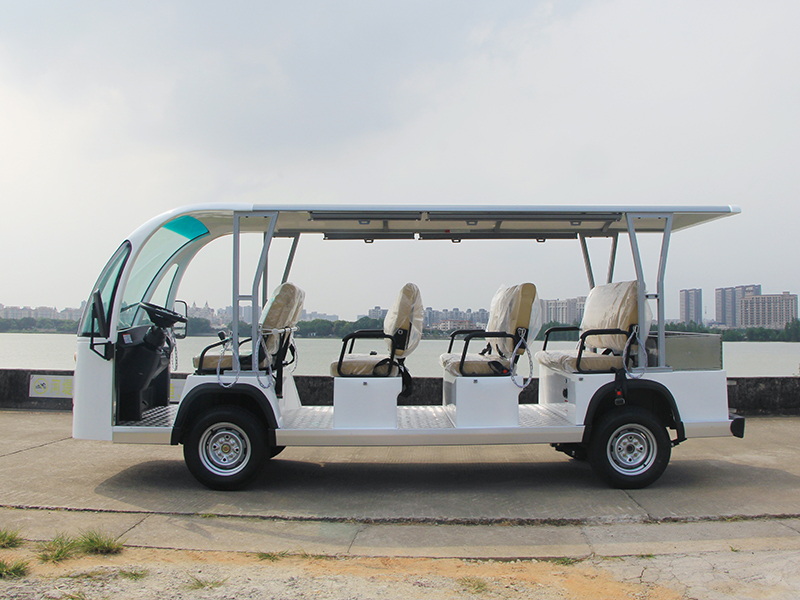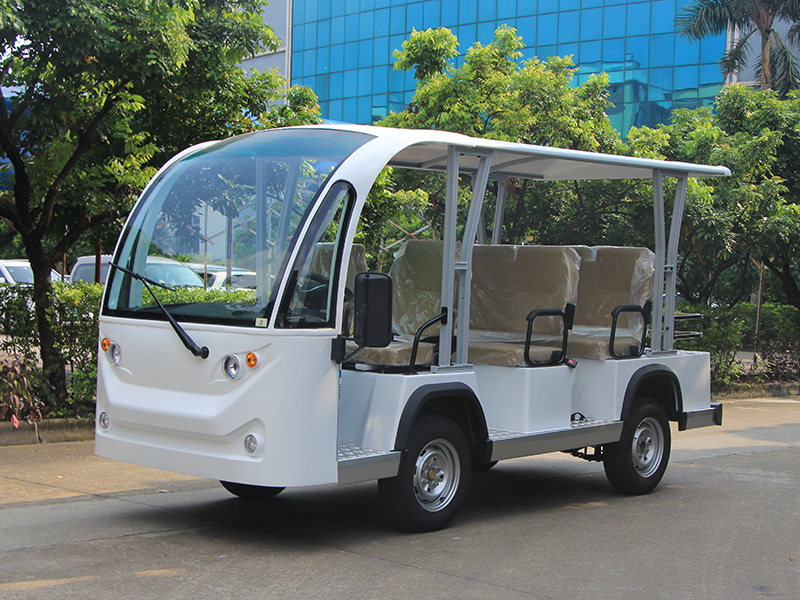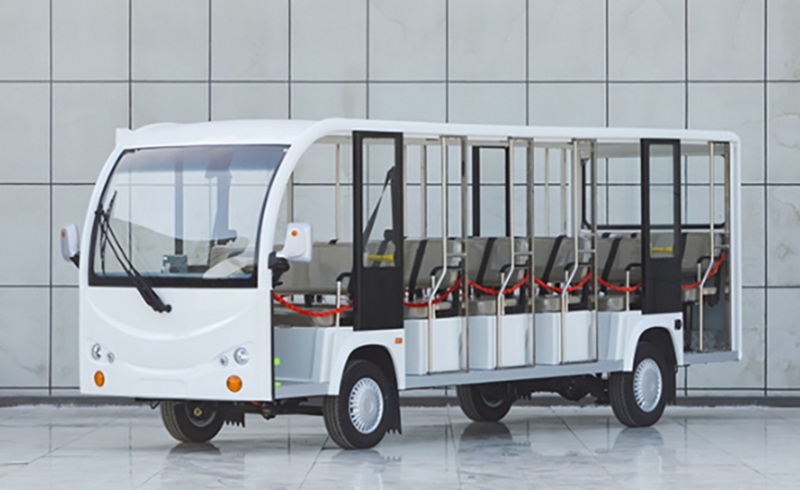Content Menu
● Understanding Electric Sightseeing Buses
● Key Factors to Compare Electric Sightseeing Bus Manufacturers
>> 1. Quality of Manufacturing
>> 2. Cost Considerations
>> 3. Manufacturer Reputation and Experience
>> 4. Product Range and Innovation
>> 5. Delivery and Customization Flexibility
● Leading Electric Sightseeing Bus Manufacturers to Consider
● Additional Considerations When Choosing a Manufacturer
>> Environmental Compliance and Sustainability
>> Financing and Payment Terms
>> Compatibility with Local Infrastructure
>> After-Sales Network and Spare Parts Availability
● Conclusion
● FAQ
>> 1. What certifications should I look for in electric sightseeing bus manufacturers?
>> 2. How does battery type affect the cost and quality of electric sightseeing buses?
>> 3. Are custom-built electric sightseeing buses more expensive?
>> 4. How can I verify the reputation of an electric sightseeing bus manufacturer?
>> 5. What are the advantages of electric sightseeing buses over traditional diesel buses?
Electric sightseeing buses have become increasingly popular worldwide due to their eco-friendly nature, quiet operation, and suitability for urban tourism. Choosing the right manufacturer is crucial to ensure you get a product that balances quality, cost, and features tailored to your needs. This comprehensive guide will help you compare electric sightseeing bus manufacturers effectively, focusing on quality indicators, cost considerations, and additional factors to make an informed decision.

Understanding Electric Sightseeing Buses
Electric sightseeing buses are designed specifically for transporting tourists around cities, resorts, parks, and other attractions. They are powered by electric motors, which provide zero emissions and quieter rides compared to traditional diesel buses. There are several types available, including:
- Double-decker electric sightseeing buses offering panoramic views from two levels.
- Low-floor electric buses designed for easy accessibility.
- Custom-built electric buses tailored to specific customer needs, such as seating capacity or battery size.
These buses are often equipped with large windows, open or semi-open roofs, and comfortable seating arrangements to enhance the sightseeing experience. Additionally, many models include features such as audio guides, LED lighting, and climate control to improve passenger comfort.
Key Factors to Compare Electric Sightseeing Bus Manufacturers
1. Quality of Manufacturing
Quality is paramount when selecting an electric sightseeing bus manufacturer. Key aspects to evaluate include:
- Certifications and Standards: Reputable manufacturers often hold ISO certifications such as ISO9001 (quality management), ISO14001 (environmental management), and ISO45001 (occupational health and safety). These certifications indicate adherence to international standards and demonstrate a commitment to quality and sustainability.
- Materials Used: High-quality buses use durable materials like reinforced steel frameworks, fiberglass, and eco-friendly composites to ensure safety and longevity. The choice of materials affects the bus's weight, durability, and resistance to environmental factors such as rust and corrosion.
- Battery Technology: The type and quality of batteries (e.g., lithium-ion, LFP lithium batteries) affect range, charging time, and durability. Leading manufacturers provide reliable battery systems with long life cycles, fast charging capabilities, and safety features like thermal management to prevent overheating.
- Motor and Controller: Efficient AC motors and controllers improve performance and energy efficiency. Look for manufacturers who specify motor power, torque, and controller types, as these influence acceleration, top speed, and energy consumption.
- Safety Features: Check for features such as front and rear lights, side and rearview mirrors, electric horns, anti-lock braking systems (ABS), and rust-proof coatings. Safety certifications and compliance with local regulations are also critical.
2. Cost Considerations
Cost varies widely depending on bus size, capacity, features, and manufacturer location. Key points include:
- Price Range: Electric sightseeing buses typically range from around US$2,980 to over US$15,000 per unit depending on specifications and manufacturer. Prices may fluctuate based on battery capacity, seating arrangements, and additional customizations.
- MOQ (Minimum Order Quantity): Some manufacturers require purchasing multiple units, which affects upfront investment. It is important to clarify MOQ and negotiate terms if you require a single or limited number of buses.
- Customization Costs: Custom-built buses may cost more but offer tailored solutions such as specific seating layouts, branding, or special features like wheelchair accessibility or panoramic roofs.
- Warranty and After-Sales Service: Consider manufacturers that provide warranties covering batteries, motors, and other critical components. Reliable after-sales support, including spare parts availability and technical assistance, reduces long-term operational costs.
- Operating Costs: Factor in battery replacement, maintenance, and charging infrastructure expenses. High-quality batteries and efficient motors reduce electricity consumption and maintenance frequency, lowering total cost of ownership.
3. Manufacturer Reputation and Experience
- Years in Business: Established manufacturers tend to have more refined products, proven track records, and better customer service. Longevity in the industry often correlates with reliability.
- Client Portfolio: Check if the manufacturer has supplied buses to well-known clients or large events (e.g., LangQing Electric Vehicle Co., Ltd. as a partner for the Canton Fair). This can indicate trustworthiness and product quality.
- Customer Reviews and Ratings: Platforms like Alibaba and Made-in-China provide ratings and reviews from previous buyers. Pay attention to feedback on product durability, delivery times, and post-sale support.
- Production Capacity: Ensure the manufacturer can meet your order volume and delivery timelines, especially if you plan to scale your fleet.
4. Product Range and Innovation
- Variety of Models: Some manufacturers offer a wide range of models, including open-top, closed, low-floor, and double-decker buses. A broad product range allows you to select a bus that fits your specific operational environment and passenger capacity.
- Technological Innovations: Look for advanced battery management systems, regenerative braking, and energy-efficient designs. Innovations such as smart dashboards, GPS tracking, and remote diagnostics can improve fleet management.
- Eco-Friendly Features: Emphasis on zero emissions, noise reduction, and recyclable materials aligns with sustainability goals and may qualify for government incentives or subsidies.
5. Delivery and Customization Flexibility
- Lead Time: Delivery times vary depending on the manufacturer's production schedule and your customization requirements. Confirm estimated lead times to align with your operational plans.
- Customization Options: Some manufacturers allow extensive customization, including branding, interior design, seating configurations, and additional accessories like audio systems or sunshades.
- Training and Support: Manufacturers offering driver training, maintenance workshops, and technical manuals add value and ensure smooth operation.

Leading Electric Sightseeing Bus Manufacturers to Consider
| Manufacturer | Location | Certifications | Price Range (USD) | Notable Features |
| Guangzhou Langqing Electric Car Co. | China | ISO9001, ISO14001, ISO45001 | $6,650 - $6,800 | High-quality steel framework, fast delivery |
| Guizhou Zhonghui Heavy Industry Co. | China | ISO9001, ISO14001, ISO45001 | $8,600 - $15,850 | Large capacity models, secured trading |
| Guangdong Marshell Electric Vehicle | China | ISO9001, ISO14001, ISO45001 | $6,800 - $12,000 | Lithium battery powered, customizable |
| Sichuan Weilang New Energy | China | Diamond Member | $7,000 - $8,500 | Mini sightseeing buses with laminated windshield |
| BYD Company Ltd. | China | International certifications | Varies | Large-scale production, advanced battery tech |
These manufacturers are known for their quality, certifications, and competitive pricing in the electric sightseeing bus market. They offer a variety of models suitable for different environments, from urban centers to scenic parks.
Additional Considerations When Choosing a Manufacturer
Environmental Compliance and Sustainability
Many cities and tourist destinations have strict environmental regulations. Choosing a manufacturer committed to sustainability not only ensures compliance but also enhances your brand image. Look for manufacturers that use recyclable materials, implement waste reduction in production, and offer energy-efficient buses.
Financing and Payment Terms
Some manufacturers provide flexible financing options, leasing plans, or installment payments. Understanding payment terms upfront can help manage cash flow and investment planning.
Compatibility with Local Infrastructure
Ensure that the electric buses are compatible with your local charging infrastructure. Some manufacturers offer fast-charging solutions or battery swapping technology, which can reduce downtime.
After-Sales Network and Spare Parts Availability
A robust after-sales network ensures quick access to spare parts and technical support. This is particularly important for electric components like batteries and controllers, which may require specialized service.
Conclusion
Comparing electric sightseeing bus manufacturers by quality and cost involves a careful evaluation of certifications, material quality, battery and motor technology, pricing, and manufacturer reputation. Leading Chinese manufacturers like Guangzhou Langqing, Guizhou Zhonghui, and Guangdong Marshell provide a wide range of options with competitive pricing and strong quality assurance. Buyers should also consider after-sales service, warranty, customization capabilities, and compatibility with local infrastructure to ensure the bus meets their operational needs. Utilizing online platforms and manufacturer portfolios can help make an informed choice that balances cost efficiency with long-term reliability and sustainability.

FAQ
1. What certifications should I look for in electric sightseeing bus manufacturers?
Look for ISO9001 (quality management), ISO14001 (environmental management), and ISO45001 (occupational health and safety) certifications to ensure high manufacturing standards and compliance with international regulations.
2. How does battery type affect the cost and quality of electric sightseeing buses?
Lithium-ion and LFP lithium batteries offer longer range and durability but may increase upfront cost. Battery quality directly impacts operating costs, charging time, and overall bus lifespan.
3. Are custom-built electric sightseeing buses more expensive?
Yes, custom-built buses tailored to specific requirements usually cost more but provide better suitability for unique operational needs, such as specific passenger capacity, branding, or accessibility features.
4. How can I verify the reputation of an electric sightseeing bus manufacturer?
Check reviews on platforms like Alibaba and Made-in-China, verify certifications, research their client portfolio, and consider years of experience and production capacity.
5. What are the advantages of electric sightseeing buses over traditional diesel buses?
Electric buses have zero emissions, quieter operation, lower maintenance costs, and are environmentally friendly, making them ideal for tourist areas and cities with strict pollution controls.










































